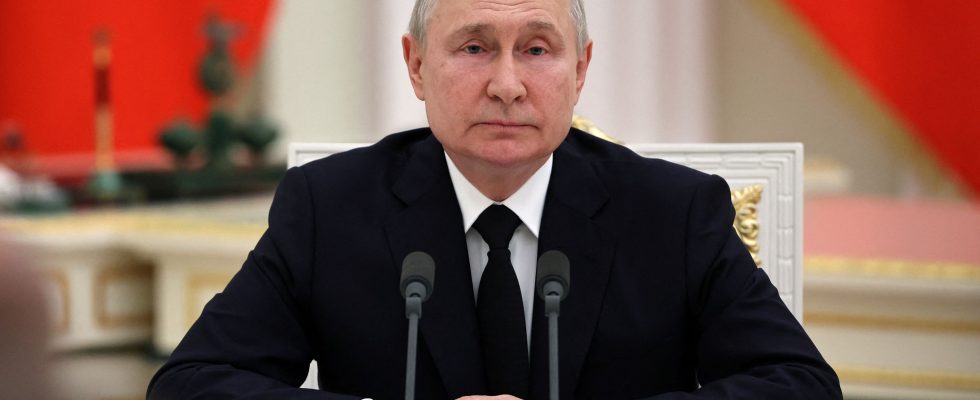1) Are other rebellions possible?
In a country that swears only by the “vertical power” and Putin’s sacrosanct “stability”, it has now been established, since the rebellion of Yevgueni Prigojine, that several thousand men with arms and baggage can force the Russian border, occupy a city of one million people and rush into Moscow, with neither the police nor the army finding fault. “In an authoritarian system, such a display of weakness is dangerous, writes on Twitter the Russian-American expert Dmitri Alperovitch. This does not mean that someone will try to attack Putin tomorrow. But the latter is running the risks becoming useless: different clans within the system might decide to follow Prigozhin’s lead and advance their interests without seeking Kremlin approval.”
From there to see columns of soldiers and armored vehicles on the Russian highways, like those launched by the head of Wagner? “There is no one else in Russia who has his own private army and who could decide to try the same thing,” considers political scientist Fyodor Krasheninnikov. Except maybe Ramzan Kadyrov. But a priori, power in Moscow does not interest him…”
Other observers are less categorical. “Today in Russia, absolutely anything is possible,” commented political scientist Dimitri Kolezev, recently in exile. An armed revolt, a military coup… Everyone in the elites has seen that power is weak and that soon it will be up for grabs. There is no more stability, Putin put an end to it when he invaded Ukraine. This war will return to Russian territory. She’s even coming back already…”
Could Prigozhin himself try his luck again? “Even if he goes to Belarus, he is not completely offside, considers Russian journalist and special services expert Andrei Soldatov. Nothing prevents him from reassembling an army”. Unlikely? Wagner’s tanks rushing into Moscow were just as much a few days ago…
2) The specter of a “great purge”?
“Are you able to forgive?” Asked a journalist to Russian President Vladimir Putin in 2018. “Yes, but not everything!”, replies, with a mocking air, the head of the Kremlin. “What is unforgivable in your eyes?” Resumes the interviewer. “The treason.” Five years later, here is Putin defied by his former trustee, Evgueni Prigojine, the ex-hot-dog salesman from Saint Petersburg who owes him everything. If the Russian authorities announced on June 27 the abandonment of the proceedings against Wagner, the fate of his boss remains uncertain. At the time of writing these lines, he had neither been arrested nor liquidated, he had just agreed to go into exile in Belarus.
More than once, Putin has let cross the red lines he himself set. After the earthquake of this aborted insurrection, will it rage like the bloodthirsty Ivan the Terrible or the “red tyrant” Stalin? For the Russian journalist in exile Roman Anine, founder of the media iStories, the “North Korean scenario” is not to be excluded. In other words, “the advent of a military dictatorship characterized by large-scale repression. Anyone potentially dangerous to the regime could then be targeted”.
“Wagner arrived 200 kilometers from Moscow without firing a shot, recalls historian Françoise Thom. Putin will want revenge by cleaning up the army and intelligence, where Prigojine certainly benefited from complicity”. Before qualifying: “But the regime does not have the means to orchestrate great Stalinist purges, given the inertia of the state apparatus”. Is there only interest? For the president, too spectacular a repression would be an ultimate sign of weakness. Unless his survival depends on it…
3) What future for Prigojine and Wagner?
In his first audio message since his aborted mutiny on June 26, Evgueni Prigojine claims to have acted only to save Wagner, threatened with dissolution by his sworn enemy: the Minister of Defense. And the boss to ensure that his multinational, established in Syria and in a dozen African countries, has found a way out in Belarus. “President Lukashenko has offered us to find a solution so that the Wagner company can continue to operate legally.” No one knows the content of this deal, let alone its longevity.
“The pressure has subsided, each of the parties can very well overturn the table again,” said Russian political scientist Tatiana Stanovaya. Difficult at this stage to assess the real balance of power between the two former allies Putin and Prigojine. “Prigozhin represents a private military company, but he does not own it and he does not control military resources. If his militia and his contracts with the Ministry of Defense are taken away from him, he will become insignificant”, believes Maxim Trudolyubov , editor-in-chief of the independent Russian-language media Meduza, in Riga.
What about Wagner’s activities abroad? The holding company has been the armed wing of Russian foreign policy for nearly a decade. On June 26, Foreign Minister Sergei Lavrov assured that the mercenary company would continue to operate in Mali and the Central African Republic. Isolated on the international scene, surrounded by sanctions, the Russian regime has every interest in taking care of these new African partners, precious supporters of the United Nations General Assembly and customers of its weapons.
Prigojine, information manipulation expert via his “troll farms”, may not have said his last word in Russia. “He may be a criminal, but his statements resonate with many Russians, especially soldiers. He talks about corruption in the army, claims that this war only benefits the oligarchs, that the Minister of Defense is stupid and corrupt… All of this is true,” points out exiled journalist Roman Anine. Like Napoleon retired on the island of Elba, Prigojine could well prepare the sequel, from afar. As long as he’s alive…
